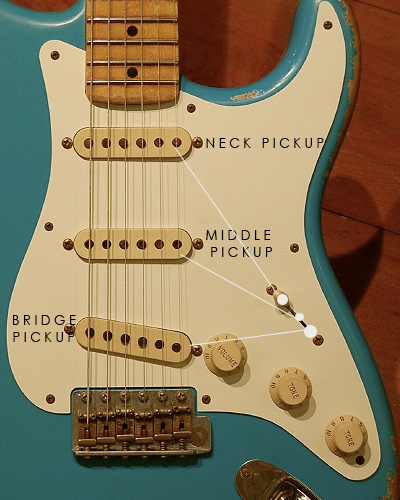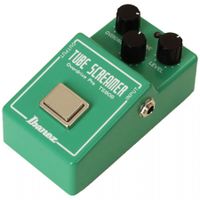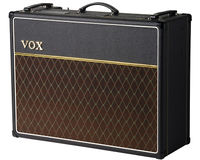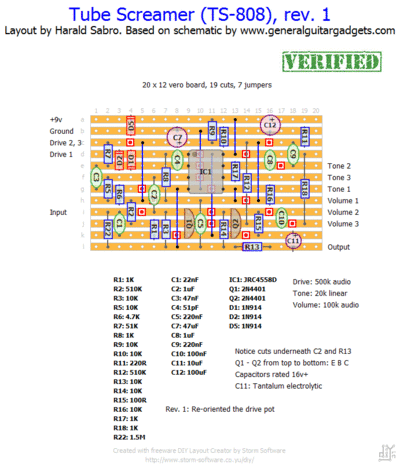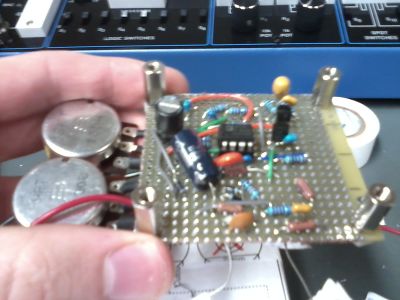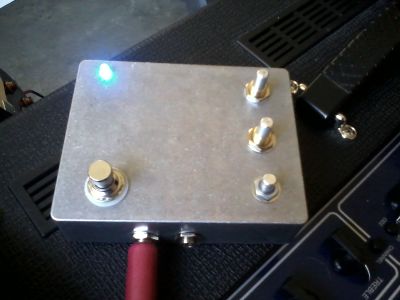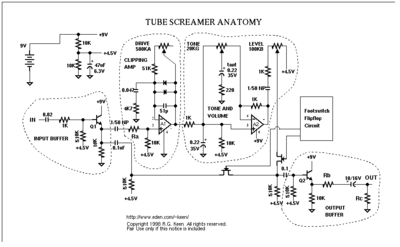Difference between revisions of "Electronics"
| Line 7: | Line 7: | ||
I want to understand what makes overdrive sound good. Oftentimes, when people speak of "distortion", they are talking about noise that is unwanted, but with guitars, there is a good distortion, which make the guitar signal sound good. As I built the pedal, I analyzed it with an oscilloscope, as well as did research, to better understand what makes it sound qualitatively good to human ears. | I want to understand what makes overdrive sound good. Oftentimes, when people speak of "distortion", they are talking about noise that is unwanted, but with guitars, there is a good distortion, which make the guitar signal sound good. As I built the pedal, I analyzed it with an oscilloscope, as well as did research, to better understand what makes it sound qualitatively good to human ears. | ||
| − | + | Basic Guitar Physics | |
| + | *An electric guitar works by converting sound into an alternating current, using pickups. A pickup is a magnet with wire densely coiled around it. It creates a magnetic field around the guitar string, so that when the string vibrates, there is a change in the magnetic field, and a voltage is created in the coiled wires. | ||
| + | [[File:Pickup Schematic.gif]] [[File:Fender_guitar_pickups.jpg]] | ||
| + | |||
| + | The signal then goes through the effects pedal and then is turned back into sound waves at the speaker. | ||
| + | [[File:TubeScreamer.jpg|200px|left]] [[File:Vox AC30.jpg|200px]] | ||
| + | |||
| + | So if we are sending a clean signal into the effect, what will come out? | ||
| + | *To answer that question we will look at what the circuit is, qualitatively and quantitatively. | ||
| + | |||
| + | Qualitatively: | ||
| + | *This is the layout I used to wire up my circuit: | ||
| + | [[File:Layout TubeScreamer.gif|400px|left]] | ||
| + | |||
| + | And this is what the circuit looked like when I finished: | ||
| + | [[File:0315141950-01.jpg|400px|right]] | ||
| + | |||
| + | [[File:0321141432-00.jpg|thumb|400px|left|And this is how it looks in an enclosure]] | ||
| − | + | ||
| − | [[File: | + | |
| + | |||
| + | Quantitatively: | ||
| + | *This is the circuit diagram: | ||
| + | [[File:Tube_Screamer_Anatomy.gif|400px|left]] | ||
Revision as of 13:39, 21 March 2014
-Electronics-
Winter 2014 For my project I am building an electric guitar analog effects pedal. The pedal is called the "Tube Screamer" and is an overdrive effect, which clips an amplified signal.
Why build a guitar pedal? I want to understand what makes overdrive sound good. Oftentimes, when people speak of "distortion", they are talking about noise that is unwanted, but with guitars, there is a good distortion, which make the guitar signal sound good. As I built the pedal, I analyzed it with an oscilloscope, as well as did research, to better understand what makes it sound qualitatively good to human ears.
Basic Guitar Physics
- An electric guitar works by converting sound into an alternating current, using pickups. A pickup is a magnet with wire densely coiled around it. It creates a magnetic field around the guitar string, so that when the string vibrates, there is a change in the magnetic field, and a voltage is created in the coiled wires.
The signal then goes through the effects pedal and then is turned back into sound waves at the speaker.
So if we are sending a clean signal into the effect, what will come out?
- To answer that question we will look at what the circuit is, qualitatively and quantitatively.
Qualitatively:
- This is the layout I used to wire up my circuit:
And this is what the circuit looked like when I finished:
Quantitatively:
- This is the circuit diagram:

